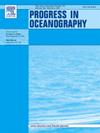Future climate projections in the global coastal ocean
IF 3.6
3区 地球科学
Q1 OCEANOGRAPHY
引用次数: 0
Abstract
Resilient coastal communities and sustainable marine economies require actionable knowledge to plan for and adapt to emerging and potential future climate change, particularly in relation to ecosystem services and coastal hazards. Such knowledge necessarily draws heavily on coastal ocean modelling of future climate impacts, using a great diversity of both global and regional approaches to explore multiple societal challenges in coastal and shelf seas around the world. In this paper, we explore the challenges, solutions and benefits of developing a better coordinated and global approach to future climate impacts modelling of the coastal ocean, in the context of the UN Decade of Ocean Science for Sustainable Development project Future Coastal Ocean Climates (FLAME; part of the CoastPredict programme). Particularly, we address the need for diverse modelling approaches to meet different societal challenges, how regions can be harmonised through clustering and typology approaches, and how coordination of experimental designs can promote a better understanding of uncertainties and regional responses. Improved harmonisation of future climate impact projections in the global coastal ocean would allow sectoral and cross-sectoral global scale risk assessments, improve process understanding and help build capacity in under-represented areas such as the global south and small island developing states. We conclude with a proposed framework for a Global Coastal Ocean Model Intercomparison Project.

全球沿海海洋的未来气候预测
有复原力的沿海社区和可持续的海洋经济需要可操作的知识来规划和适应正在出现的和潜在的未来气候变化,特别是与生态系统服务和沿海灾害有关的气候变化。这些知识必然大量依赖于未来气候影响的沿海海洋模型,利用全球和区域方法的多样性来探索世界各地沿海和大陆架海的多种社会挑战。在本文中,我们探讨了在联合国海洋科学促进可持续发展十年项目“未来沿海海洋气候”(FLAME;海岸预测计划的一部分)。特别是,我们解决了不同建模方法的需求,以满足不同的社会挑战,如何通过聚类和类型学方法协调区域,以及如何协调实验设计可以促进更好地理解不确定性和区域反应。改善全球沿海海洋未来气候影响预测的协调将允许进行部门和跨部门的全球规模风险评估,改善对过程的理解,并帮助在代表性不足的地区(如全球南方和小岛屿发展中国家)建立能力。最后,我们提出了一个全球沿海海洋模式比较项目的框架。
本文章由计算机程序翻译,如有差异,请以英文原文为准。
求助全文
约1分钟内获得全文
求助全文
来源期刊

Progress in Oceanography
地学-海洋学
CiteScore
7.20
自引率
4.90%
发文量
138
审稿时长
3 months
期刊介绍:
Progress in Oceanography publishes the longer, more comprehensive papers that most oceanographers feel are necessary, on occasion, to do justice to their work. Contributions are generally either a review of an aspect of oceanography or a treatise on an expanding oceanographic subject. The articles cover the entire spectrum of disciplines within the science of oceanography. Occasionally volumes are devoted to collections of papers and conference proceedings of exceptional interest. Essential reading for all oceanographers.
 求助内容:
求助内容: 应助结果提醒方式:
应助结果提醒方式:


